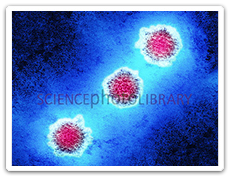Genital Herpes (Herpes simplex)
 Genital herpes is a sexually transmitted infection (STI) caused by the herpes simplex virus type 1 (HSV-1) or type 2 (HSV-2). The infection can cause multiple outbreaks of painful blisters and sores on the genitals and/or mouth. In some cases, herpes infection can lead to serious illness.
Genital herpes is a sexually transmitted infection (STI) caused by the herpes simplex virus type 1 (HSV-1) or type 2 (HSV-2). The infection can cause multiple outbreaks of painful blisters and sores on the genitals and/or mouth. In some cases, herpes infection can lead to serious illness.
Image Content Provider: Hazel Appleton, Centre for Infections/Health Protection Agency/Science Photo Library
Symptoms
Many people who are infected with genital herpes are unaware they have the virus. This is because they don't recognize the signs and symptoms. These also may come and go.
The first signs and symptoms may include painful red dots or tiny red blisters on the genitals, swollen glands, fever and body aches. They often appear 2 to 14 days after having sex with an infected person. They can last for two to four weeks.
Typically, symptoms reoccur weeks or months after the first occurrence. When they do, they are almost always less severe and last shorter. Although the infection can stay in the body indefinitely, these reoccurrences tend to become less frequent over a period of years. In some cases, signs and symptoms may not be observed for months or years.
The only way to know for sure if you have a herpes infection is to be tested.
Causes
Genital herpes is spread through sexual contact (oral, anal and genital). The virus can spread whether or not the infected person has sores. Women who are infected with HSV late in pregnancy can pass the infection to their baby during childbirth. This leads to severe illness in the newborn infant.
The virus can also travel to different parts of the body. It can cause disease in that part of the body.
Treatment
There is no cure for genital herpes. Treatment is focused on helping relieve the symptoms and decreasing the chance of spreading to others. In order to be effective, these treatments must be started immediately after signs and symptoms appear. So if you think you have herpes, see a health care provider right away.
Prevention
Genital herpes can be prevented by always avoiding risky behaviours. These include having multiple sexual partners and unprotected sex.
Persons with herpes should abstain from sex with uninfected partners when signs and symptoms of herpes are present. But it is important to know that even if there are no sign or symptom, an infected person can still infect their sex partners. Sex partners of infected persons should be advised that they may become infected. They should always use condoms to reduce the risk.
Resources
- Centers for Disease Control and Prevention – Genital Herpes – CDC Fact Sheet
- Health Canada – Genital Herpes
- HealthLink BC – Genital Herpes
- Public Health Agency of Canada – Canadian Guidelines on Sexually Transmitted Infections
- SexualityandU.ca – Viral STIs-STDs
Communicable Disease
Control (CDC) Health Links – Info Santé |


